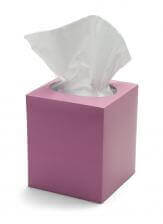4 Top Causes of Chronic Sniffles
Find out what causes a persistent runny or stuffy nose, and how you can treat it.

That’s because the cold and flu virus isn’t the only cause of nasal symptoms. In fact, some of us may even suffer year-round with “rhinitis,” the fancy doctor lingo used to describe the sniffles. It may seem benign enough, but when the runny nose, nasal congestion, sneezing, and/or nasal itching become a daily battle, it can be quite a nuisance.
The cold and flu virus typically lasts about 7-10 days. So if your nose is running a lot longer than that, it’s time to re-examine the situation and find out if there is possibly something else that can be causing your nose to run this marathon.
Here are 4 possible culprits of rhinitis:
Culprit #1: Allergies
By far one of the top causes of the chronic sniffles is allergies, or what doctors think they so cleverly call “allergic rhinitis.” Up to one third of adults suffer from this, and it can either be seasonal or year-round. Common triggers are in the environment (not in food), and include pollen, dust, grass, trees, and mold.
There are two mainstays of treatment for this. First, over-the-counter long-acting antihistamines, such as loratidine and cetirizine, work to dry up the runs. And second, prescription nasal sprays work to decrease the inflammation in the back of the nose and eventually stop the drip down the other end towards the throat. This helps with the chronic sore throat and allergic cough that some people experience because of allergic rhinitis.
Culprit #2: Nasal Irritants
Some people experience nasal symptoms from certain irritants that don’t necessarily cause the same immune response as an allergy. These irritants are often changes in the weather (especially the dry, cold weather of the winter months), cigarette smoke, alcohol ingestion, air pollution, and the smell of chemicals or perfumes. These irritants cause the tiny blood vessels in the nose to open up and leak fluid. This phenomenon is referred to as “vasomotor rhinitis,” and the treatment is a different prescription nasal spray that helps to close off these opened blood vessels. Nasal saline irrigation can also help to cleanse these pesky irritants out of the nose. If the culprit is job related, wear a mask. If your nose hates your or your partner’s perfume, stop using it.
Culprit #3: Medications
So you have a runny or stuffy nose that won’t let up – what’s the logical next step, you ask? Let’s run to the drug store and try some of these over-the-counter nasal sprays, right? Wrong! Some of these OTC sprays can actually do the opposite in the long run! Once the nasal spray wears off, your nose will run hard to place first place in that marathon. Your symptoms not only may return, but they return even worse. Doctor’s call this a “rebound” phenomenon, in which spraying the nose causes you to want to spray even more and turns this into a nasty cycle of overuse and the sniffles. Your nose actually becomes dependent on these sprays and wants more and more of it. Nasal saline products are fine, but I would avoid any OTC decongestant nasal sprays.
There are other medications that can cause the snot to pour out or plug up. These include some blood pressure medications, antipsychotics, antidepressants, hormonal contraceptives, prostate enlargement pills, and medicines used to treat erectile dysfunction.
Culprit #4: Pregnancy
Some women may experience stuffed nasal passages during their pregnancies. It’s a normal phenomenon that occurs due to the body’s hormone changes. Nasal saline and some over-the-counter antihistamines can help, but make sure to run any products by your obstetrician before you use them, even if they are over-the-counter. Thankfully, pregnancy-related sniffles resolve within two weeks of delivery (when you’re probably too tired to even notice them).
And there you have it, 4 top causes of the chronic sniffles. Don’t let your nose outrun you – visit your doctor for some tricks and tips to stop it in its tracks!
Please note that all content here is strictly for informational purposes only. This content does not substitute any medical advice, and does not replace any medical judgment or reasoning by your own personal health provider. Please always seek a licensed physician in your area regarding all health related questions and issues.
Tissue Box image courtesy of Shutterstock


